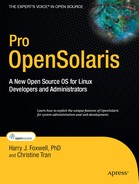APPENDIX B
OpenSolaris 2009.06
The OpenSolaris update cycle plans for new stable binary releases approximately every six months. At the time of this book's publication, the next such release is expected to be OpenSolaris 2009.06. This appendix covers some of the new features anticipated in this release.
SPARC Support
The first two releases of OpenSolaris (2008.05 and the current 2008.11) were for Intel and AMD processors only. Now that the boot process for SPARC processors has been updated to recognize ZFS file systems, OpenSolaris 2009.06 will be installable on these systems, although support for Logical Domains (LDoms on the UltraSPARC Sun4v architecture) is planned for a later release. The http://pkg.opensolaris.org/dev repository has already been updated to include SPARC packages for this build. At this time, however, you need to use the OpenSolaris Automated Installer (AI; http://www.opensolaris.org/os/project/caiman/auto_install/) for SPARC systems; detailed instructions for this installation method are at http://www.opensolaris.org/os/project/caiman/auto_install/AI_install_server_setup.html.
We look forward to this release so that the OpenSolaris community will have access to a SPARC development platform and can learn to exploit the parallelism of multicore/multithread SPARC processors.
Project Crossbow
As a complement to virtualization technologies for OS environments, network virtualization techniques are now being developed and will begin to appear in OpenSolaris 2009.06. The OpenSolaris Crossbow Project (http://opensolaris.org/os/project/crossbow/) provides tools for virtualizing the entire network software and hardware stack and for managing the resource allocations for specific protocols. The project page says this:
Each virtual stack can be assigned its own priority and bandwidth on a shared NIC without causing any performance degradation. The architecture dynamically manages priority and bandwidth resources, and can provide better defense against denial-of-service attacks directed at a particular service or virtual machine by isolating the impact just to that entity. The virtual stacks are separated by means of H/W classification engine such that traffic for one stack does not impact other virtual stacks.
Crossbow tools will allow you to create and configure multiple virtual NIC devices (VNICs) per hardware NIC, assigning a VNIC to each VM or zone, and to set bandwidth and priority limits for services and protocols assigned to each VNIC. Crossbow will also allow you to model and simulate complex networks within your OpenSolaris system. You can download and try early access builds of the Crossbow software at http://opensolaris.org/os/project/crossbow/snapshots/.
Encrypted ZFS File System
This project (http://opensolaris.org/os/project/zfs-crypto/) implements on-disk encryption of ZFS file systems in the OpenSolaris kernel, enabling data security on any ZFS file system from laptops through enterprise servers. This feature will provide encryption of the ZFS I/O data stream and will include key management for ZFS file systems. All dataset data, metadata, and properties will be encrypted. File system encryption is becoming a requirement in many government agencies and in organizations that require encryption to guarantee client data privacy. It's also becoming essential for protecting data on laptops in the event of theft. OpenSolaris with encrypted ZFS will provide this level of data security.
CUPS Printing
Although you can manually install the CUPS printing service on OpenSolaris 2008.11, full support for this service is planned for OpenSolaris 2009.06 (http://opensolaris.org/os/community/printing/Documentation/cupsprint/). CUPS is an open source, IPP-protocol system for managing local and network printers and print queues. It lets you discover and install new printers through a web browser interface.
Other Anticipated Features
According to the announcements and developer discussions on the OpenSolaris web site, there will be continued improvements in the 2009.06 release for current features such as network automagic, package management, automated install, and a host of new software in the network package repositories. Watch the http://opensolaris.org/os web site for news about new OpenSolaris releases and features.
